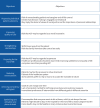Advance care planning in patients with respiratory failure
- PMID: 39537243
- PMCID: PMC11558536
- DOI: 10.1183/16000617.0120-2024
Advance care planning in patients with respiratory failure
Abstract
Advance care planning (ACP) is a complex and iterative communication process between patients, surrogates and clinicians that defines goals of care that may include, but is not limited to, documentation of advance directives. The aim of ACP is to promote patient-centred care tailored to the patient's clinical situation through informed preparation for the future and improved communication between patient, clinicians and surrogates, if the latter need to make decisions on patient's behalf.The aim of this article is to review research related to ACP in acute and chronic respiratory failure, regarding the process, communication, shared decision-making, implementation and outcomes.Research has produced controversial results on ACP interventions due to the heterogeneity of measures and outcomes, but positive outcomes have been described regarding the quality of patient-physician communication, preference for comfort care, decisional conflict and patient-caregiver congruence of preferences and improved documentation of ACP or advance directives.The main barriers to ACP in chronic respiratory failure are the uncertainty of prognosis (particularly in the organ failure trajectory), the choice of the best timing for initiation and the lack of training of healthcare workers. In acute respiratory failure, the ACP process can be very short, should include the patient whenever possible, and is based on a discussion of treatments appropriate to the patient's functional status prior to the event (e.g. assessment of frailty) and clear communication of the likely consequences of possible options.All healthcare worker dealing with patients with serious illnesses should have training in communication skills to promote engagement in ACP discussions.
Copyright ©The authors 2024.
Conflict of interest statement
Conflict of interest: C. Ribeiro has nothing to disclose. P. Pamplona reports support for attending meetings from Vitalaire. A.K. Simonds reports travel financial support for speaking at ERS conferences and IRC meetings.
Figures




References
Publication types
MeSH terms
LinkOut - more resources
Full Text Sources
Medical
